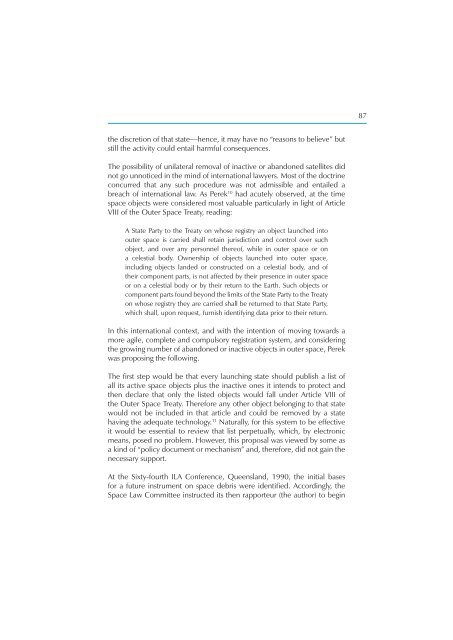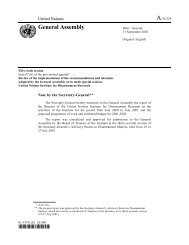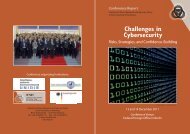Security in Space The Next Generation - UNIDIR
Security in Space The Next Generation - UNIDIR
Security in Space The Next Generation - UNIDIR
You also want an ePaper? Increase the reach of your titles
YUMPU automatically turns print PDFs into web optimized ePapers that Google loves.
the discretion of that state—hence, it may have no “reasons to believe” but<br />
still the activity could entail harmful consequences.<br />
<strong>The</strong> possibility of unilateral removal of <strong>in</strong>active or abandoned satellites did<br />
not go unnoticed <strong>in</strong> the m<strong>in</strong>d of <strong>in</strong>ternational lawyers. Most of the doctr<strong>in</strong>e<br />
concurred that any such procedure was not admissible and entailed a<br />
breach of <strong>in</strong>ternational law. As Perek 10 had acutely observed, at the time<br />
space objects were considered most valuable particularly <strong>in</strong> light of Article<br />
VIII of the Outer <strong>Space</strong> Treaty, read<strong>in</strong>g:<br />
A State Party to the Treaty on whose registry an object launched <strong>in</strong>to<br />
outer space is carried shall reta<strong>in</strong> jurisdiction and control over such<br />
object, and over any personnel thereof, while <strong>in</strong> outer space or on<br />
a celestial body. Ownership of objects launched <strong>in</strong>to outer space,<br />
<strong>in</strong>clud<strong>in</strong>g objects landed or constructed on a celestial body, and of<br />
their component parts, is not affected by their presence <strong>in</strong> outer space<br />
or on a celestial body or by their return to the Earth. Such objects or<br />
component parts found beyond the limits of the State Party to the Treaty<br />
on whose registry they are carried shall be returned to that State Party,<br />
which shall, upon request, furnish identify<strong>in</strong>g data prior to their return.<br />
In this <strong>in</strong>ternational context, and with the <strong>in</strong>tention of mov<strong>in</strong>g towards a<br />
more agile, complete and compulsory registration system, and consider<strong>in</strong>g<br />
the grow<strong>in</strong>g number of abandoned or <strong>in</strong>active objects <strong>in</strong> outer space, Perek<br />
was propos<strong>in</strong>g the follow<strong>in</strong>g.<br />
<strong>The</strong> fi rst step would be that every launch<strong>in</strong>g state should publish a list of<br />
all its active space objects plus the <strong>in</strong>active ones it <strong>in</strong>tends to protect and<br />
then declare that only the listed objects would fall under Article VIII of<br />
the Outer <strong>Space</strong> Treaty. <strong>The</strong>refore any other object belong<strong>in</strong>g to that state<br />
would not be <strong>in</strong>cluded <strong>in</strong> that article and could be removed by a state<br />
hav<strong>in</strong>g the adequate technology. 11 Naturally, for this system to be effective<br />
it would be essential to review that list perpetually, which, by electronic<br />
means, posed no problem. However, this proposal was viewed by some as<br />
a k<strong>in</strong>d of “policy document or mechanism” and, therefore, did not ga<strong>in</strong> the<br />
necessary support.<br />
At the Sixty-fourth ILA Conference, Queensland, 1990, the <strong>in</strong>itial bases<br />
for a future <strong>in</strong>strument on space debris were identifi ed. Accord<strong>in</strong>gly, the<br />
<strong>Space</strong> Law Committee <strong>in</strong>structed its then rapporteur (the author) to beg<strong>in</strong><br />
87








